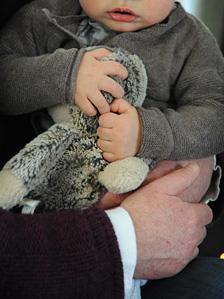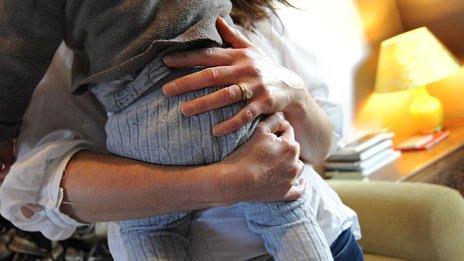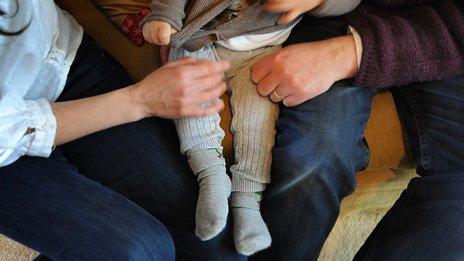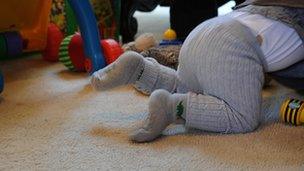Adoptive parents talk of baby joy after wait
- Published

Ruby's birth mother has had five children taken into care
The Fostering Network is warning of a shortfall of almost 9,000 foster families in the UK, but for one lucky baby, a period of fostering led to successful adoption into a family.
When baby Ruby came into the world it wasn't just the usual gaggle of expectant family members who collected for her arrival.
Social workers, foster carers, medics and two would-be adoptive parents were also waiting anxiously for news.
For Ruby, not her real name, was born to a drug-addicted mother. Social services had decided to remove her at birth into emergency foster care.
Kate and Rob, a couple who have been wanting a child for more than a decade, had already been lined up as prospective adopters by children's charity Coram.
The couple knew the history. The mother had already had five children removed from her care.
But they wanted a child so much they were prepared to risk taking on a baby potentially damaged by her mother's drug use.
"We were on standby. We'd bought all the baby kit and everything," said Rob.
"But the judge who heard the case decided to give the mother a last chance."
Their hopes of a baby dashed, the couple consoled themselves with the thought that mother and child would stay together.
"We said to ourselves this was the best option," said Kate. "But we were really sad because we had so been looking forward to having her here with us."
The troubled birth mother managed two weeks' contact with Ruby, who was born healthy and whose early needs were tended to by a very experienced foster carer.
Kate and Rob knew nothing of this and all hopes of making Ruby their own faded - at least for a time.
Wrong colour
The disappointment they felt was not their first. They had already had a rough ride to potential parenthood.
Kate said she discovered she was unlikely to have children naturally about 11 years ago when a previously unknown medical condition emerged.

Children in care are protected from upheaval under concurrent planning
"We did a few IVFs which didn't work and it took quite a while to come around to the thought of adoption. There was quite a lot of grieving, I guess, and it took about four years," she said.
They first put themselves forward as adopters through the conventional route with their local authority.
But after six months were told it was unlikely because they were a white couple in an ethnic minority area, and the council did not favour cross-racial adoptions.
"It was so painful waiting. You are ready to be a family and to care for a child but you have to put your life on hold," Kate said.
Then the couple heard about a new way of arranging adoptions called concurrent planning, pioneered by Coram.
'Win-win for baby'
Jeanne Kaniuk, head of the charity's adoption and permanent families service, said under the scheme a child under the age of two in care is found suitable foster carers who are ready and willing to adopt them later - if the courts decide that adoption the best option for them.
She added: "While the courts are deciding about this, the baby keeps in touch with his or her natural parents through very regular contact meetings so that bond is maintained.
"The baby is in a win-win situation as she or he will have a relationship with the carers and also with his/her parents.
"Whatever the outcome, concurrent planning gives children the chance of finding stability and forming secure relationships from the earliest opportunity," she added.

Councils have been criticised for unnecessary slow adoptions
In this way the child is protected from the upheaval of moving between families while their future is being decided.
So Kate and Rob began the process of gaining approval as potential adopters through Coram's concurrent planning scheme.
Kate said: "It was intense and a bit gruelling. There are lots of interviews about every aspect of your life and the way you have been brought up."
Then, about seven years after they had learned they were unlikely to have children of their own, they gained approval as suitable adoptive parents.
And some time later they were lined up as potential adopters for Ruby.
After the initial disappointment, the couple heard nothing more of the child until February this year.
"We thought she'd gone out of our lives completely, then we got called into what we thought was a routine administrative meeting at the offices and there she was with the foster carer.

Children spend an average of two years and seven months waiting to be adopted
"We couldn't believe it. She was just lovely."
After a five-day introduction and a careful process of settling in, Kate and Rob brought Ruby, then aged four months, home.
"It was wonderful that first time just to hold her - we were just full of wonder. I carried her in to the house. She was asleep and a neighbour saw me and we just cried and cried," said Kate.
Family feeling
But at this point, the couple were still only foster carers.
"We didn't call ourselves mum and dad. There was a lot of holding back. I would always say 'if she stays'. But we loved her very quickly."
The couple had been dreading losing Ruby again after spending a very happy nine or 10 months with her, but a few weeks ago word came that Kate and Rob were to formally adopt Ruby - although this is subject to a final approval by the courts.
"We are a family, and we feel like a family for the first time and that's massive. It's so exciting and we never believed it would happen," said Kate.
And as they prepare for their first Christmas together as a family, these proud new parents say they are determined not to spoil Ruby with too many presents.
For more information on concurrent planning visit the Coram website, external. The names of those featured in this story have been changed to protect the identities of those involved in the case.
- Published13 December 2011
- Published29 September 2011
- Published29 September 2011